Steenhuisen expresses optimism about collaborating with Minister Parks Tau to counter the looming 30% tariff

DA leader John Steenhuisen says the tariff announcement by US President Donald Trump will signal the end of the African Growth and Opportunity Act, which gives South Africa duty free access to the US for more than 6,000 products, including goods in the automobile, agricultural and textile industries.
Image: File
Agriculture Minister John Steenhuisen on Tuesday said he was looking forward to work with Trade, Industry and Competition Minister Parks Tau to seek a way to avoid the US 30% tariff for the agricultural sector.
Presenting the department's budget in the National Assembly, Steenhuisen noted that US President Donald Trump sent a letter to a number of countries, including South Africa, announcing his intention to persist with the 30% tariff on South African goods and produce exported into the US from August 1.
“While we can breathe a sign of relief that this tariff did not come into effect as it was due tomorrow, it does give us an opportunity to use the next few weeks to be able to try to negotiate a way forward to prevent this,” he said.
“Whilst not explicit, the announcement will signal the end of African Growth and Opportunity Act, which gives South Africa duty free access to the US for more than 6000 products, including goods in the automobile, agricultural and textile industries,” Steenhuisen added.
The minister also said the agricultural sector remained particularly exposed in areas of citrus, wine, nuts and table grape.
“Now more than ever it highlights the need for urgent reforms in South Africa so that we can ensure our economy meets the requirements of our trading partners around the world.
“I look forward to work with Minister Tau and others in the coming weeks to urgently seek a ways through this impasse and to ensure we avoid a 30% tariff for our agricultural sector,” he said.
Steenhuisen said the South African agriculture stood at a crossroads.
“On one side, we see the extraordinary potential of this sector to generate jobs, contribute to the gross domestic product (GDP) growth, strengthen exports, and revitalise rural economies. On the other side, we confront persistent risks: Climate shocks, high input costs, bio-security failures, land degradation, weak infrastructure, and uneven access to markets and finance,” he said.
“There is also a human reality behind the figures of smallholder farmers locked out of opportunity, of families facing food insecurity, of veterinary professionals overburdened and under-resourced, and of a nation that too often reacts to crisis rather than prepares for it.”
Steenhuisen said the budget was grounded in the 2025-30 strategic plan articulated on seven strategic priorities.
These were partnerships for growth, a modern and progressive legislative environment, improving market access, providing effective farmer support, strengthening biosecurity and disaster preparedness.
Steenhuisen further said they were implementing the 2024-2029 National Food and Nutrition Security Plan that was coordinated with the departments of health, education, social development, and environment.
ANC MP Dina Pule said the budget continued to prioritise food security initiatives from community and school nutrition guidance to commission food production schemes while also easing the cost of living by expanding the free food basket food.
“Food security is not achievable without active inclusion of our thousands of small-scale and subsistence farmers across the country.”
Pule urged all to support the budget, saying it was truly a budget for security and inclusion because the food security and farmer support programs received the largest allocation from the vote.
In rejecting the budget, MK Party’s Andile Mngxitama said over 15% of the nation was without food security.
“However, this sector, which is white agriculture, is produced for export markets. Our people eat heads and feet of chicken. The much praised white agricultural sector can't produce enough chicken to feed the nation. The state has created a conducive environment for exports to thrive. That is why the minister is lamenting the fact that Trump has imposed those tariffs,” said Mngxitama.
He also said the budget vote does not contribute to dismantling the apartheid and colonial agricultural sector.
EFF MP Kenneth Montwedi said the budget failed to appreciate the challenges faced by the agricultural sector and did not bring any tangible solution to addressing such.
He said the country was in a man-made crisis of foot and mouth disease because the minister dropped the ball and dissolved a multidisciplinary team established by former minister Thoko Didiza.
“We must locate the current challenges of foot and mouth disease right on the doorstep of the Minister of Agriculture,” Montwedi added.
mayibongwe.maqhina@inl.co.za